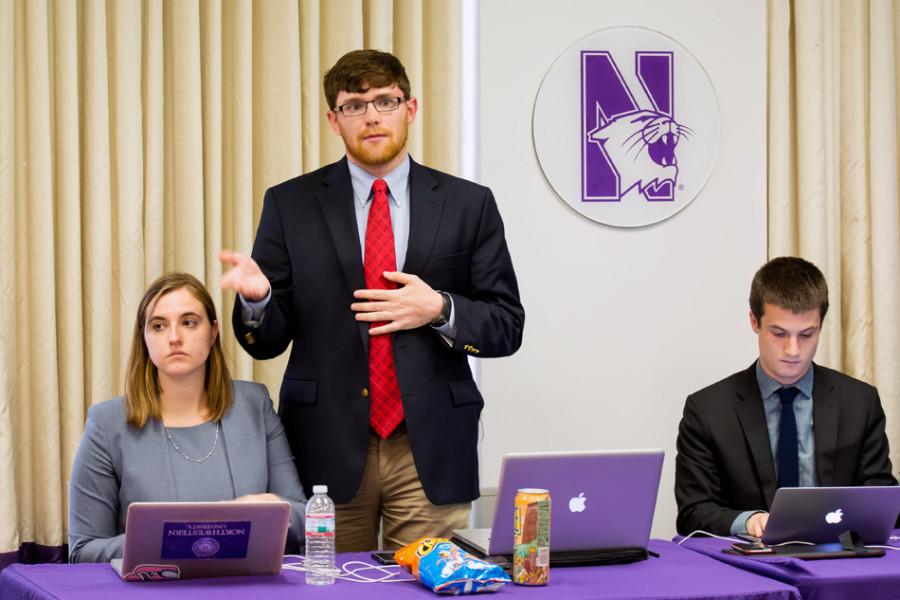Star, Kim launch campaign to include students in task force
Sydney Lindsey/The Daily Northwestern
Communication senior Sean Earley, a member of the A-status finances committee, speaks to Senate at its meeting Wednesday. He said the committee spent more than 80 hours drafting the proposal for the roughly $1.1 million A-status funding plan, which Senate approved.
May 28, 2015
ASG’s president and executive vice president launched a campaign at Wednesday’s Senate meeting to pressure Provost Daniel Linzer to include more students in a faculty task force examining the undergraduate academic experience.
The three-hour meeting began with Associated Student Government President Noah Star and Executive Vice President Christina Kim asking senators to email Linzer and publicize a petition calling on the provost to increase the number of undergraduate students on the task force from one to five. As of Wednesday night, about 500 people have signed the petition.
“If we pay,” Star said, “we should have a say.”
The last time a similar task force convened was in 1988, Star said, and five students sat on the committee.
Star, a Weinberg junior, said the task force could push for reforms student government has advocated for, such as credit requirement reform and a Social Inequalities and Diversities requirement.
“All of these things are on the table,” he said. “We don’t really see how it’s legitimate to discuss the undergraduate experience with such a limited set of perspectives.”
Kim said a task force like this doesn’t come around often, so it should include student voices.
“Whatever comes out of this report will affect students for the next 20, 25 years,” the McCormick junior said. “It’s imperative we get more undergraduates on (the committee).”
Weinberg junior Riko Ohashi, ASG vice president for academics, is currently the only undergraduate student on the task force.
The task force launched in March and is tasked with spending this quarter and Fall Quarter collecting data and drafting recommendations before presenting to Linzer in Winter Quarter 2016, neurobiology Prof. Indira Raman, the task force’s chair, told The Daily earlier this month.
Raman told The Daily on Wednesday that students do have a say in the task force’s actions, and noted that both an undergraduate and a graduate student are participating. She also said the task force was “convened by the administration out of concern for students.”
“The Task Force’s first responsibility has been to absorb a great deal of data from many surveys of students (present and past), including those conducted by ASG,” she told The Daily in an email. “Additional student input (or faculty or staff input) can be shared with the Task Force through the ASG member, or through any other member of the Task Force.”
Later in the meeting, Senate approved nearly $1.1 million in A-status funding for the 2015-2016 school year after allocating almost $6,000 in amendment pool funding.
Senators spent more than two and a half hours debating how to spend the $58,925 amendment pool, the supplemental funding Senate can allocate at its discretion. Members of the A-status finances committee spoke against every motion to dip into the amendment pool and give a group extra funding.
Communication senior Sean Earley, a member of the committee, told senators the committee spends more than 80 hours deliberating and forming a funding proposal.
“You should let that influence your discretion,” he said. “Because if you’re going to use discretion to overturn (our) reasons, then you should have a really strong, logical reason.”
Throughout the session, the committee stressed that senators should be frugal with allocating the amendment pool.
McCormick junior Magan Omar, a committee member, said senators should consider the consequences of any allocation decision.
“Every dollar that comes out of the amendment pool is a dollar that other groups won’t be able to use for supplemental funding,” he said.
After rejecting a proposal to give For Members Only nearly $3,000 for its spring concert, Senate approved $1,969 for the event.
It also approved Dance Marathon’s request for $1,200 to fund porta-potties for the Winter Quarter event. Weinberg junior Kevin Harris, DM’s executive co-chair, said the funding will allow the group to increase the number of porta-potties from two to six.
A-status funding comes from a fee students pay every quarter, which will be $58 per student per quarter next year.
And, keeping with tradition, Senate gave Northwestern Community Development Corps $1,750 to buy candy for Project Pumpkin. The event, held the Thursday before Halloween, brings more than 1,000 children from Evanston and Chicago to Norris University Center to give them “a safe place to trick-or-treat,” said Weinberg senior Taylor Billings, outgoing NCDC co-chair.
Senate approved the funding after a comedic PowerPoint presentation that featured Billings dissecting the lyrics to Aaron Carter’s 2000 song “I Want Candy.”
Earley responded with a facetious presentation that likened candy, a slang term for cocaine, to the drug, feigning opposition to the request.
Star said the exchange is a quirky Senate tradition born out of A-status finance committee rules that prohibit it from giving groups funding for food.
“A long time ago, some agreement was reached between NCDC and (the committee),” he said. “They will do this back-and-forth joke where the outgoing senior members of their committees debate the merits of giving candy to children. . . . For whatever reason, it has become customary for various degrees of theatrics to be employed in order to obtain candy.”
Email: [email protected]
Twitter: @Shane_McKeon


